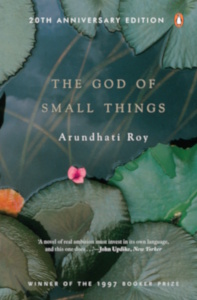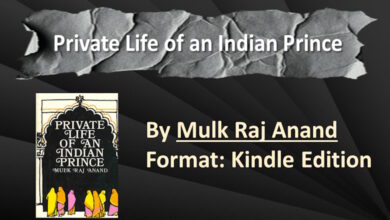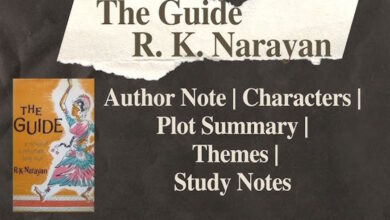The God of Small Things by Arundhati Roy – Book Review
The God of Small Things by Arundhati Roy – Honest Book Review & Summary
 Published in 1997, The God of Small Things by Arundhati Roy isn’t just a novel—it’s an emotional landscape, an echo of memories, and a lyrical meditation on love, loss, and the irreversible moments that define us. This Booker Prize-winning novel is one of the most celebrated works in Indian English literature and continues to resonate with readers across generations.
Published in 1997, The God of Small Things by Arundhati Roy isn’t just a novel—it’s an emotional landscape, an echo of memories, and a lyrical meditation on love, loss, and the irreversible moments that define us. This Booker Prize-winning novel is one of the most celebrated works in Indian English literature and continues to resonate with readers across generations.
In this review, we’ll walk you through the storyline, themes, writing style, symbolism, critical acclaim, and why this book remains a must-read for every Indian reader and literature lover. Whether you’re a student, casual reader, or literary critic, this deep-dive will give you everything you need to know about The God of Small Things.
Overview of the Story The God of Small Things
Set in the lush and layered landscape of Kerala, the novel revolves around Rahel and Estha, fraternal twins whose lives are dramatically altered by a tragic incident during their childhood. The narrative shuttles between the present and the past, gradually revealing the chain of events that led to the death of a visiting English cousin, Sophie Mol.
The heart of the novel lies in family relationships, social boundaries, and the “Love Laws”—the deeply rooted norms that dictate “who should be loved, and how. And how much.” The tale touches caste discrimination, forbidden love, Indian politics, and gender expectations—all wrapped in poetic prose that captures the pain of memory and the complexity of emotions.
Characters that Leave an Impact
Rahel and Estha
The emotional core of the novel. These twins represent innocence trapped in a web of adult chaos. Their bond, their silence, and their trauma form the emotional structure of the story.
Ammu
Their mother, a woman who dares to love beyond social restrictions. She pays a heavy price for her choices. Ammu’s character is heart-wrenching yet empowering.
Velutha
A Dalit carpenter, gentle and skilled, who shares a forbidden love with Ammu. Velutha’s fate is a brutal reminder of how caste and class prejudice continue to destroy lives.
Baby Kochamma
Rahel and Estha’s manipulative great-aunt. Her bitterness and need for control add a layer of psychological drama.
Each character is deeply flawed, real, and unforgettable. Roy doesn’t offer heroes or villains—only people shaped by society, circumstance, and suppressed desires.
Themes That Resonate Deeply The God of Small Things
1. Forbidden Love
The story courageously addresses taboo relationships—between different castes and social classes. The romance between Ammu and Velutha breaks traditional norms, and the consequences are devastating.
2. Caste and Class
Roy exposes the harsh realities of India’s caste system, particularly through Velutha’s identity as an “untouchable”. Even in a modern, educated family, caste prejudice seeps into every interaction.
3. Memory and Trauma
The nonlinear structure mirrors how memory works—unpredictable, often returning to moments of trauma. The twins’ shared silence and fragmented recollections reflect how children absorb grief.
4. Political and Social Criticism
There are clear undertones of critique against Indian communism, religious hypocrisy, and societal patriarchy. Roy doesn’t shy away from speaking truth to power.
5. The Power of Small Things
The novel draws attention to the seemingly minor moments—small gestures, glances, silences—that shape a person’s fate. These “small things” matter more than the large, dramatic acts.
Writing Style – Poetic and Bold
Arundhati Roy’s prose is distinctive and poetic. She plays with language, breaks grammatical rules, and creates new rhythms. Her use of capitalization, child-like expressions, and repetition gives the book a unique voice. For example:
“It’s true. Things can change in a day.”
Her narrative structure doesn’t follow a straight line. It loops back and forth between timeframes. This can be confusing for some readers initially, but as the story unfolds, everything connects beautifully.
Her descriptions of the Kerala landscape are especially evocative. You can feel the hot monsoon air, see the lush banana trees, and hear the buzzing dragonflies. The setting becomes a character in itself.
Why the Book Still Matters
Even though The God of Small Things was published over two decades ago, its relevance remains strong. Issues like caste discrimination, gender inequality, child abuse, and political corruption are still part of the Indian social fabric.
Roy’s courage to tell an uncomfortable story, from the point of view of a young girl and through a feminist lens, was groundbreaking at the time. Today, it’s an essential read to understand the complex social dynamics of India.
Criticism and Controversy
The book did not come without its critics. Some readers found the nonlinear structure difficult to follow. Others thought the book was too political or too experimental.
Additionally, Roy faced backlash in India for the explicit portrayal of sex and for criticizing Indian institutions in her later essays and activism. However, these criticisms only cement her position as a fearless and authentic writer.
Awards and Global Recognition The God of Small Things
-
Booker Prize (1997): Arundhati Roy became the first Indian woman to win this prestigious literary award.
-
The book has been translated into over 40 languages and is a bestseller globally.
-
It remains on many university reading lists and literary syllabi across the world.
Should You Read It?
Absolutely yes.
If you enjoy literature that dives deep into human emotion, social injustice, and beautiful prose, The God of Small Things is for you. It’s not just a novel—it’s an experience. It challenges you, moves you, and stays with you long after you’ve turned the last page.
However, it is not a light read. The structure and themes require attention and emotional involvement. But the payoff is immense—both intellectually and emotionally.
Key Takeaways
-
Author: Arundhati Roy
-
Published: 1997
-
Genre: Literary Fiction / Political Fiction
-
Setting: Kerala, India
-
Notable For: Nonlinear narrative, poetic language, social commentary, Booker Prize win
Final Verdict: 9.5/10
Arundhati Roy’s The God of Small Things is a modern classic. It’s a daring, lyrical, and heartbreaking exploration of love, identity, and the silent violence of societal norms. While it demands patience and maturity from its readers, the emotional reward it offers is profound. Buy it from amazon
Frequently Asked Questions (FAQs)
Q1: Is The God of Small Things based on a true story?
A: No, the book is a work of fiction. However, many elements reflect real-life issues in Indian society, like caste discrimination and gender inequality.
Q2: Why is the book told in a nonlinear format?
A: The nonlinear structure mirrors how memory and trauma work. It helps in slowly revealing the mystery while emotionally engaging the reader.
Q3: Is it suitable for young readers?
A: Due to its mature themes and complex narrative, it’s more suitable for adult readers or older teens.
Q4: What makes this book different from other Indian novels?
A: Roy’s unique writing style, the poetic use of language, and bold social commentary set this novel apart from most Indian fiction.
Q5: Why was Arundhati Roy criticized for this book?
A: Some found the book too political or sexually explicit. However, it was also widely praised for its honesty and literary brilliance.



